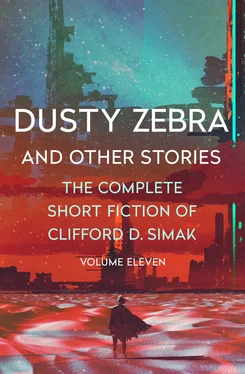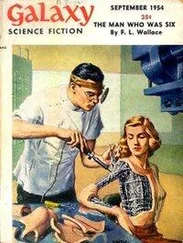The house stood on the hilltop, a huddled structure that had taken root and crouched close against the earth. So old that it was the color of the things around it, of grass and flowers and trees, of sky and wind and weather. A house built by men who loved it and the surrounding acres even as the dogs now loved them. Built and lived in and died in by a legendary family that had left a meteoric trail across centuries of time. Men who lent their shadows to the stories that were told around the blazing fireplace of stormy nights when the wind sucked along the eaves. Stories of Bruce Webster and the first dog, Nathaniel; of a man named Grant who had given Nathaniel a word to pass along; of another man who had tried to reach the stars and of the old man who had sat waiting for him in the wheelchair on the lawn. And other stories of the ogre mutants the dogs had watched for years.
And now the men had gone and the family was a name and the dogs carried on as Grant had told Nathaniel that far-gone day they must.
As if you were men, as if the dog were man . Those were the words that had been handed down for ten full centuries—and at last the time had come.
The dogs had come home when the men had gone, come from the far corners of the earth back to the place where the first dog had spoken the first word, where the first dog had read the first line of print—back to Webster House where a man, long ago, had dreamed of a dual civilization, of man and dog going down the ages, hand in paw.
“We’ve done the best we could,” said Ebenezer, almost as if he were speaking to someone. “We still are doing it.”
From the other side of the hill came the tinkle of a cow bell, a burst of frantic barking. The pups were bringing in the cows for the evening milking.
The dust of centuries lay within the vault, a gray, powdery dust that was not an alien thing, but a part of the place itself—the part that had died in the passing of the years.
Jon Webster smelled the acrid scent of the dust cutting through the mustiness of the room, heard the silence humming like a song within his head. One dim radium bulb glowed above the panel with its switch and wheel and half a dozen dials.
Fearful of disturbing the sleeping silence, Webster moved forward quietly, half awed by the weight of time that seemed to press down from the ceiling. He reached out a finger and touched the open switch, as if he had expected it might not be there, as if he must feel the pressure of it against his fingertip to know that it was there.
And it was there. It and the wheel and dials, with the single light above them. And that was all. There was nothing else. In all that small, bare vault there was nothing else.
Exactly as the old map had said that it would be.
Jon Webster shook his head, thinking: I might have known that it would have been. The map was right. The map remembered. We were the ones that had forgotten—forgotten or never known or never cared. And he knew that more than likely it was the last that would be right. Never cared.
Although it was probable that very few had ever known about this vault. Had never known because it was best that only few should know. That it never had been used was no factor in its secrecy. There might have been a day—
He stared at the panel, wondering. Slowly his hand reached out again and then he jerked it back. Better not, he told himself, better not. For the map had given no clue to the purpose of the vault, to the mechanics of the switch.
“Defense,” the map had said, and that was all.
Defense! Of course, there would have been defense back in that day of a thousand years ago. A defense that never had been needed, but a defense that had to be there, a defense against the emergency of uncertainty. For the brotherhood of peoples even then was a shaky thing that a single word or act might have thrown out of kilter. Even after ten centuries of peace, the memory of war would have been a living thing—an ever-present possibility in the mind of the World Committee, something to be circumvented, something to be ready for.
Webster stood stiff and straight, listening to the pulse of history beating in the room. History that had run its course and ended. History that had come to a dead end—a stream that suddenly had flowed into the backwater of a few hundred futile human lives and now was a stagnant pool unrelieved by the eddying of human struggle and achievement.
He reached out a hand, put it flat against the masonry, felt the slimy cold, the rough crawl of dust beneath his palm.
The foundation of empire, he thought. The subcellar of empire. The nethermost stone of the towering structure that soared in proud strength on the surface far above—a great building that in olden times had hummed with the business of a solar system, an empire not in the sense of conquest but an empire of orderly human relations based on mutual respect and tolerant understanding.
A seat of human government lent an easy confidence by the psychological fact of an adequate and foolproof defense. For it would have been both adequate and foolproof, it would have had to be. The men of that day took no chances, overlooked no bets. They had come up through the hard school and they knew their way around.
Slowly, Webster swung about, stared at the trail his feet had left across the dust. Silently, stepping carefully, following the trail he’d made, he left the vault, closed the massive door behind him and spun the lock that held its secret fast.
Climbing the tunneled stairs, he thought: Now I can write my history. My notes are almost complete and I know how it should go. It will be brilliant and exhaustive and it might be interesting if anyone should read it.
But he knew that no one would. No one would take the time or care.
For a long moment, Webster stood on the broad marble steps before his house, looking down the street. A pretty street, he told himself, the prettiest street in all Geneva, with its boulevard of trees, its carefully tended flower beds, the walks that glistened with the scrub and polish of ever-working robots.
No one moved along the street and it wasn’t strange. The robots had finished their work early in the day and there were few people.
From some high treetop a bird sang and the song was one with the sun and flowers, a gladsome song that strained at the bursting throat, a song that tripped and skipped with boundless joy.
A neat street drowsing in the sun and a great, proud city that had lost its purpose. A street that should be filled with laughing children and strolling lovers and old men resting in the sun. And a city, the last city on Earth, the only city on Earth, that should be filled with noise and business.
A bird sang and a man stood on the steps and looked and the tulips nodded blissfully in the tiny fragrant breeze that wafted down the street.
Webster turned to the door, fumbled it open, walked across the threshold.
The room was hushed and solemn, cathedral-like with its stained glass windows and soft carpeting. Old wood glowed with the patina of age and silver and brass winked briefly in the light that fell from the slender windows. Over the fireplace hung a massive canvas, done in subdued coloring—a house upon a hill, a house that had grown roots and clung against the land with a jealous grip. Smoke came from the chimney, a wind-whipped, tenuous smoke that smudged across a storm-gray sky.
Webster walked across the room and there was no sound of walking. The rugs, he thought, the rugs protect the quietness of the place. Randall wanted to do this one over, too, but I wouldn’t let him touch it and I’m glad I didn’t. A man must keep something that is old, something he can cling to, something that is a heritage and a legacy and promise.
He reached his desk, thumbed a tumbler and the light came on above it. Slowly, he let himself into a chair, reached out for the portfolio of notes. He flipped the cover open and stared at the title page: “A study of the Functional Development of the City of Geneva.”
Читать дальше












